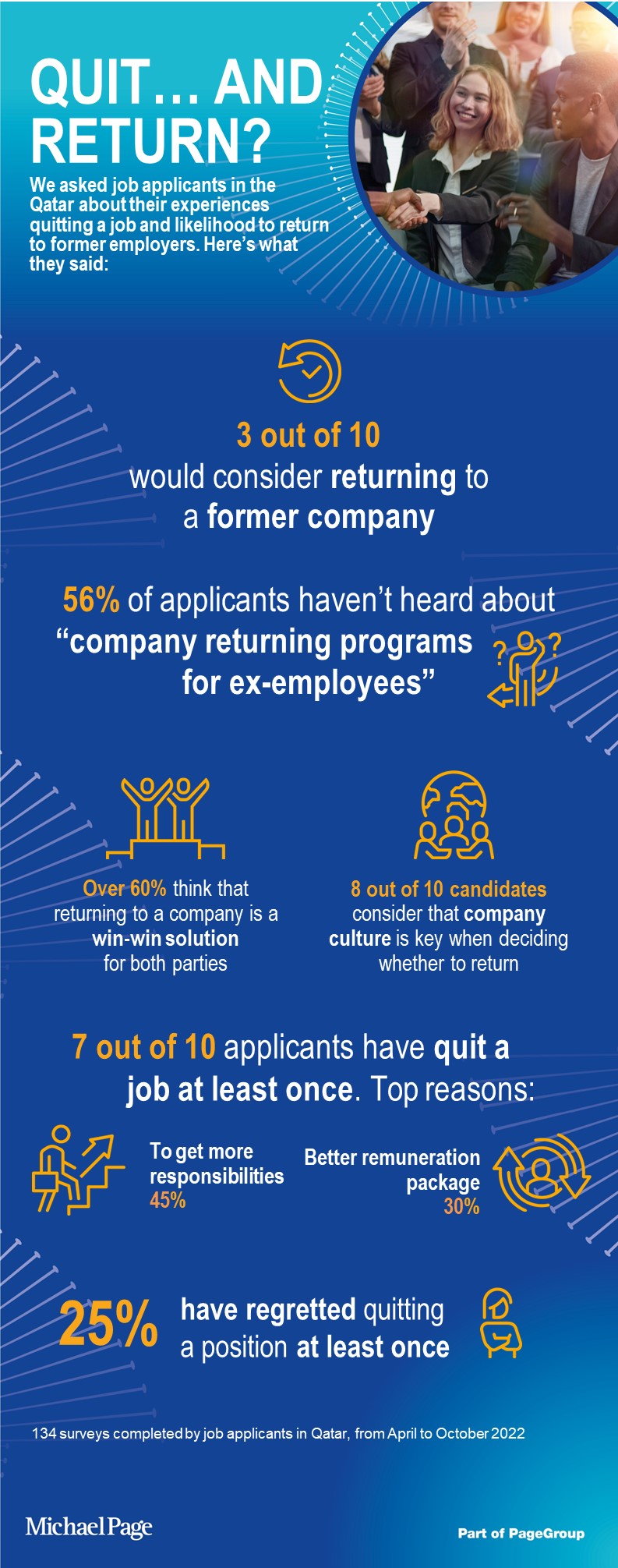Hiring? Let’s Find Your Perfect Talent
Looking for top professionals to join your team? Talk to us about your recruitment needs today.
We're aware of a global phishing scam impersonating employees via email, WhatsApp, and Telegram, but no PageGroup systems have been breached. Find out how to protect yourself

Quitting a job is rarely an easy decision and it’s unwise to make assumptions about why people do it. For every professional who leaves a position because they are unhappy, there are others who love their current colleagues and employer and are simply looking to take their careers to the next level.
In a competitive hiring market, companies can’t afford to “forget” about talented employees who leave on good terms and who could be tempted to return if the opportunity arose. That’s why many employers now have return programs that allow them to keep in touch with their alumni and, if circumstances allow, re-hire them.
To learn more about why people quit and whether they would consider re-joining a former employer, we surveyed 134 job applicants in Qatar. Let’s look at what they said.
More than seven in ten (76%) respondents said they’d quit a position voluntarily at least once. So what factors triggered their decision to leave?
A key takeaway from these results is that a feeling of having reached their limit is a critical factor in many people’s decision to leave. Some employees have aspirations and ambitions that simply can’t be satisfied by their current employer. Steps companies can take to retain these workers include fast-tracking their career development and offering improved compensation packages. However, if an employee wants to change industries altogether or needs to leave for personal reasons, there’s little a company can do to stop them.
Not everyone who leaves a company has another position lined up. A little under half of respondents said they’d resigned from a job at least once in their careers without having a new job to go to.
A substantial number do not, considering it was their own choice to leave. Only 25% of the respondents said they’d left a position and later regretted it. Of these:
What can we learn from these findings? First, they confirm what most professionals already know: moving to a new position is always a little risky and not every opportunity lives up to its billing. Second, they underscore the importance of the human factor. Employees often form very close and mutually rewarding relationships with their co-workers. Even people who don’t regret leaving a job often miss their former colleagues. Given this, does it not make sense to think about former employers when considering your career options? Let’s look at the data. &
Can going backwards in one sense take you forward in another? 33% of respondents said that they have either taken a position with one of their former employers or would consider doing so if the opportunity arose.
That’s a big potential talent pool for companies struggling to plug gaps in their workforces! But are companies doing enough to promote their return programs and encourage these former employees to return to the fold?
It appears not. About 56% of the respondents said they hadn’t even heard about these programs.
Companies clearly have their work cut out to make these initiatives more visible. At the same time, they need to be continually reviewing and improving their organisational culture, with 80% of survey respondents agreeing that this is a critical factor in whether an employee decides to return.
The good news for companies is that about half of the respondents think that it is not a mistake to return to a former employee. About 47% of the respondents disagreed with “returning programs” while 34% neither agreed nor disagreed. Furthermore, a majority (64%) thought that, in the end, returning was a win-win solution for companies and their former employees.
These are encouraging statistics for companies considering making re-hiring part of their recruitment strategy. By setting up return programs and using social media and other channels to make them as visible as possible, employers can broaden their talent pools to include familiar as well as new faces.
Michael Page is committed to providing candidates with the best possible experience, for the benefit of both job seekers and employers. Our recruiters can connect you with top talent in your industry and location, so if you’re looking to hire, contact us today. If you’re looking for a job – and a great candidate experience – please visit our Candidate Help Centre.
Looking for top professionals to join your team? Talk to us about your recruitment needs today.
Get the latest salary benchmarks and hiring trends across industries in the Middle East.
Michael Page International (UAE) Limited, Registration No. 0207 a DIFC registered company. Al Fattan Currency House Tower -1. Dubai International Financial Centre (DIFC)., Office No. 202, Dubai,